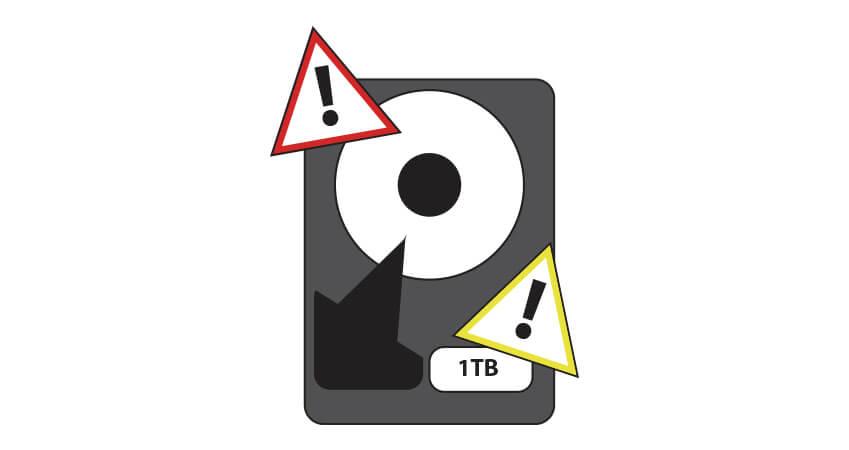
Your computer’s hard drive is the heart of your system. It stores everything—from your operating system and applications to your work files, family photos, and personal data. But like any hardware, hard drives don’t last forever. They can fail suddenly, taking your important data with them. The good news is that most hard drives give off clear warnings before they crash. Recognizing these signs early can help you avoid data loss, save money, and prevent downtime.
If you’ve ever wondered how to tell if your hard drive is failing, this guide is for you. Here are the five most common warning signs that your hard drive might be in trouble—and what you should do about it.
Strange Noises Coming from Your Computer
One of the most obvious signs of hard drive failure is strange, unfamiliar noises coming from your computer. You may hear clicking, grinding, or whirring sounds that weren’t there before. These noises often indicate mechanical issues inside traditional spinning hard drives, usually caused by a failing read/write head or spindle motor. While solid-state drives (SSDs) don’t make mechanical noises, similar issues can still arise through system slowdowns or errors.
If you hear unusual sounds and suspect a hard drive issue, it’s time to act quickly. These noises typically mean your drive is in its final stages, and continued use may cause permanent data loss. Back up your files immediately and seek professional help to avoid irreversible damage.
Files Are Disappearing or Corrupting
Another key symptom of a failing hard drive is the sudden disappearance or corruption of files. You might notice documents that were once accessible are now unreadable, or certain programs begin to crash unexpectedly. In some cases, files may open but contain strange characters, missing data, or incomplete content.
These are clear signs your hard drive is failing, especially if they happen across multiple file types or folders. It’s not just a glitch—it could be your drive losing its ability to store and retrieve data properly. If you notice this happening regularly, it’s a red flag that shouldn’t be ignored.
System Freezing or Slow Performance
Your computer’s speed can often reveal issues with the hard drive. If your system begins freezing, taking forever to boot up, or loading programs painfully slow, it might be more than just a software problem. These failing hard drive symptoms usually mean your system is struggling to access data stored on the drive.
Sluggish performance combined with frequent crashes or unexpected reboots can signal the beginning stages of hard drive failure. While these issues might resemble RAM problems or malware, they should never be dismissed without checking the health of the drive.
Frequent Error Messages or Blue Screen Crashes
If you’re repeatedly getting system errors, file path issues, or the dreaded blue screen of death, your hard drive may be failing. These error messages might seem random, but they often indicate your computer is having trouble reading or writing data.
These messages may include warnings about unreadable boot devices, corrupted sectors, or drive not found. They’re not just technical hiccups—they’re one of the most serious hard drive failure signs. When these types of alerts appear regularly, it’s time to look deeper and consider immediate action.
The Drive Is Not Recognized by the System
When your computer stops detecting the hard drive altogether, it’s a critical failure point. You may boot up your system only to find the drive missing in BIOS or File Explorer. In other cases, it might show up but prompt you to format it, even if it was working fine just days ago.
This is one of the last and most dangerous signs your hard drive is failing. If the system cannot detect the drive or keeps asking to format it, you’re likely facing physical damage or corrupted firmware. Ignoring this issue may result in total data loss, which is why early detection and professional support are vital.
How to Check If Hard Drive Is Failing
If you’re experiencing any of the above issues and want to verify your suspicion, you can use built-in tools like CHKDSK on Windows or Disk Utility on Mac. These utilities can scan for bad sectors and provide a status check of your drive’s health. However, these tools may not catch every issue, especially those at the hardware level.
For more reliable diagnostics, consider third-party tools designed specifically to assess drive health. SMART (Self-Monitoring, Analysis, and Reporting Technology) tools can provide deeper insights into your hard drive’s performance metrics. But if you’re not comfortable running these tests, it’s best to consult a repair technician.
Don’t Wait Until It’s Too Late
Most people don’t think about their hard drive until something goes wrong. But by the time major symptoms appear, it might already be too late to save your data. If you’re noticing any of the signs mentioned above—like strange noises, corrupt files, or system crashes—it’s best to back up your data and have your device examined as soon as possible.
Trying to continue using a faulty drive can make things worse. Even if you can still access some of your data, every moment of continued use increases the risk of permanent loss.
Why Choose Us
At Ask Computers, we’ve helped countless customers in Toronto identify and fix hard drive failure before it became a disaster. Our team has years of experience in diagnosing hardware issues and offering fast, effective data recovery solutions. We use advanced tools to determine whether your drive can be repaired or needs to be replaced—and we do it with complete transparency and honesty.
Whether you have a traditional hard drive or a newer SSD, we can help you recover your data and get your system running like new. We offer in-store diagnostics, same-day service for most repairs, and customized data recovery plans depending on the severity of the damage. We treat your files like they’re our own—because we know how much they mean to you.
Conclusion
A failing hard drive can turn into a nightmare if ignored, but most drives don’t fail without warning. Whether it’s slow performance, strange noises, or disappearing files, these symptoms are your system’s way of asking for help. Knowing how to check if hard drive is failing and acting early can be the difference between saving your data or losing it forever.
If you’re in Toronto and have noticed any signs of hard drive failure, don’t wait for it to crash. Bring your device to Ask Computers today—we’ll diagnose the issue and help you recover your important data quickly and affordably.
Contact us now to book your repair or visit our downtown store for expert service.


